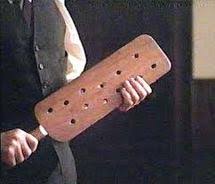Breaking News: The Supreme Court Decides Cases Based on Facts, Not Emotions

March 21, 2018
As jarring as it may seem to say, schools have every right to corporally punish poorly behaved school children. The Supreme Court case of Ingraham v. Wright upheld this claim in 1977. The Court ruled that nothing in the Constitution protects school children from school administrators. Schools have a right called “en loco parentis” which essentially gives them parental rights over their students from the time they leave for school to when they return. Since it is technically legal for parents to corporally punish their children for misbehaving, the school is well within its legal rights under en loco parentis.
Those who oppose the court’s ruling typically use the Eighth Amendment as the basis of their claims. The amendment states: “Excessive bail shall not be required, nor excessive fines imposed, nor cruel and unusual punishments inflicted,” The Constitution was written before the age of the public school system, so it would be difficult to argue that the founding fathers even had the frame of mind to propose an amendment to protect school children. Also, it is widely believed that the 8th amendment protects convicted criminals from the unfair treatment by the justice system.
Even if one were to believe that corporal punishment in schools is morally wrong, the Supreme Court does not decide cases based on their moral compasses. The grounds for appeal must rise to the level of a constitutional violation in order for the Supreme Court to grant the appeal. In this case, and in the general case of corporal punishment in schools, no student’s constitutional rights were or are being violated. For this reason, the Court left the decision for what kinds of legislation regarding corporal punishment in schools is to be established up to the states. According to a Washington Post article from 2014, “19 states still allow corporal punishment in school,” every 30 seconds in the United States, a child is corporally punished at school. While many parents and students may feel strongly that the practice is unfair and should not be used, it does not violate the law and thus the schools are well within their rights to use the practice if their respective state governments deem it legal.


